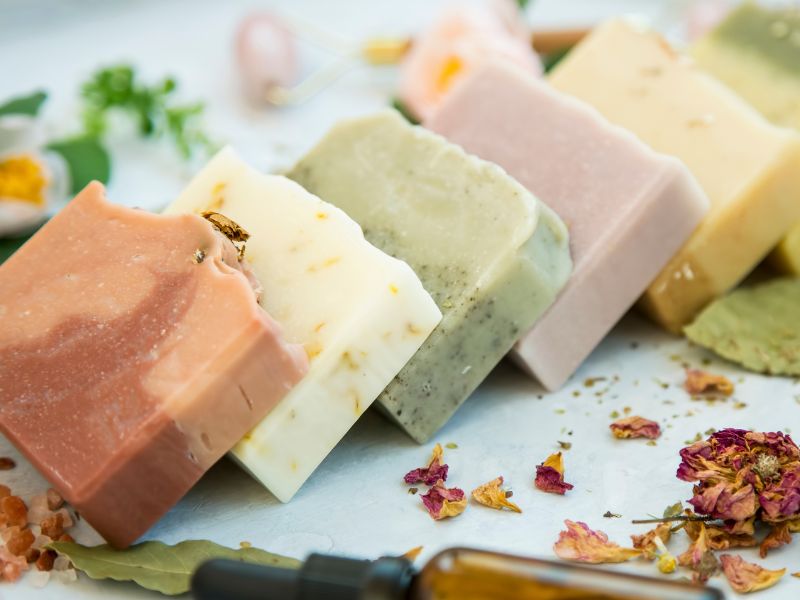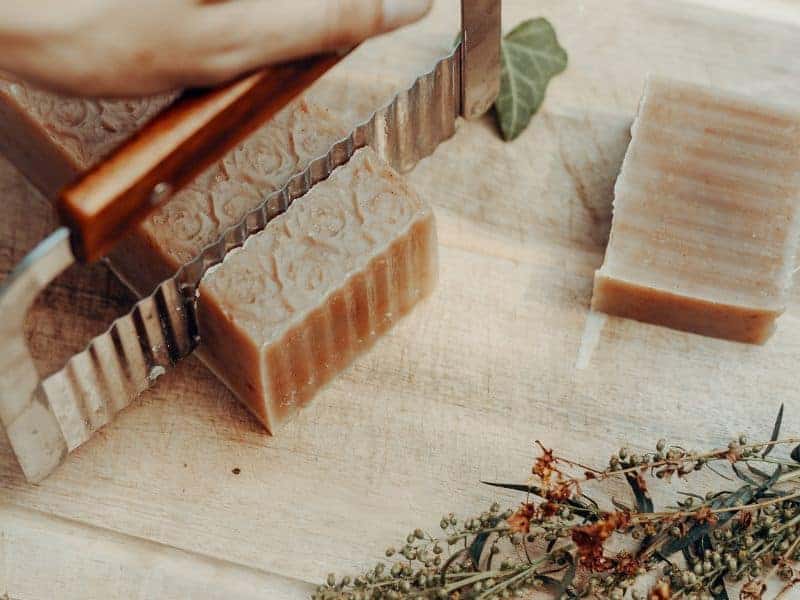Have you experienced irritation, itching, or redness after using soap? If so, you’re not alone. Many people with sensitive skin struggle to find soap that won’t cause skin irritation. That’s because some soap ingredients can be harsh and irritating to sensitive skin.
The good news is that there are alternatives out there that can help you keep your skin healthy and happy. In this article, we’ll take a look at 6 soap making ingredients that you should avoid for sensitive skin and provide you with some safer options to consider.
So, whether you have naturally sensitive skin or you’re just looking for a gentler soap alternative, read on to learn more.
6 Soap Making Ingredients to Avoid For Sensitive Skin
Here are 6 soap making ingredients you should avoid for sensitive skin, and their alternatives.
Artificial Fragrances
Artificial fragrances found in commercial soaps can irritate sensitive skin. These fragrances often contain synthetic chemicals that trigger allergies, itching, and redness. Benzyl alcohol, a commonly used chemical in synthetic fragrances, has been found to cause contact dermatitis.
To avoid irritating sensitive skin, opt for natural alternatives for soap scent. Essential oils, like lavender or chamomile, offer the benefits of aromatherapy. However, some essential oils may still cause irritation, so it’s important to use them in moderation and choose oils labeled as “skin-safe.”
Parabens
Parabens, common preservatives in soap, can cause skin reactions like itching, redness, and rashes. Moreover, parabens mimic estrogen in the body, raising concerns about potential long-term health effects.
For safer preservatives, look for soap with natural alternatives like rosemary extract, grapefruit seed extract, or vitamin E. These natural ingredients have antimicrobial properties that can help extend soap’s shelf life without irritating skin or causing hormonal imbalances. Additionally, some soap makers use natural acids, such as citric acid, to create an acidic environment that inhibits bacteria and fungi growth.
Sulfates
Sulfates, such as sodium lauryl sulfate and sodium laureth sulfate, are common foaming agents found in many soaps. However, sulfates can have a drying effect on sensitive skin, causing irritation, itching, and even inflammation. Sensitive skin requires a gentler cleansing approach that avoids harsh sulfates.
Fortunately, there are many gentle cleansing agents available that are safe for sensitive skin. Look for soaps that use milder surfactants like sodium cocoyl isethionate, sodium methyl cocoyl taurate, or decyl glucoside. These ingredients can still provide a rich lather while being much gentler on the skin.
Alcohol
Alcohol is another common ingredient found in many soaps and can cause skin irritation and dryness, especially for people with sensitive skin. Alcohol can strip the skin of its natural oils, leading to dryness, flakiness, and even eczema. Isopropyl alcohol and ethyl alcohol are two types of alcohol commonly found in soaps that can have these adverse effects.
To avoid the drying effects of alcohol, look for soap that uses non-drying alternatives like aloe vera, glycerin, or natural oils like coconut oil or olive oil. These ingredients can provide hydration to the skin while also offering additional benefits like anti-inflammatory properties. Soap made with moisturizing ingredients can help protect the skin’s natural barrier while still providing a deep cleanse.
Synthetic Dyes
Synthetic dyes are often added to soaps to enhance their appearance, but they can cause allergies and skin sensitivity, particularly for individuals with sensitive skin. Synthetic dyes like FD&C Red 40 or Yellow 5 can cause skin reactions, including itching, rashes, and hives.
To avoid the potential irritants of synthetic dyes, opt for soaps that use natural colorants like beetroot powder, turmeric, or spirulina. These ingredients not only provide beautiful natural colors to your soap, but they also offer added benefits like antioxidants and anti-inflammatory properties that can help soothe sensitive skin.
Phthalates
Phthalates are a group of chemicals used in soap and other personal care products to enhance fragrances and extend the life of the product. However, some phthalates can mimic the hormone estrogen, leading to concerns about potential long-term health effects, including hormone disruption and reproductive problems.
To avoid exposure to phthalates, look for soap that uses phthalate-free ingredients, such as natural essential oils, as fragrance alternatives. Also, read labels carefully and avoid products that list phthalates among the ingredients. Opt for soap labeled “phthalate-free” or “fragrance-free” to ensure that you’re choosing a safer soap option for your sensitive skin.
Understanding Soap and Its Ingredients
Soap is an essential item in our daily routine that helps cleanse our skin, remove dirt and oil, and promote hygiene. The primary ingredients that makeup soap are fats and an alkali.
When these two ingredients are combined, they undergo a chemical process called saponification, which results in the creation of soap. During this process, the fats are broken down into fatty acids that react with the alkali to form soap molecules and glycerin.
Over the years, the ingredients used to make soap have changed. Today, soap can be made with a variety of ingredients, each with their own benefits and drawbacks.
For people with sensitive skin, it’s crucial to choose soap ingredients that are gentle and non-irritating. Some of the most common soap ingredients to avoid for sensitive skin include artificial fragrances, parabens, sulfates, alcohol, synthetic dyes, and phthalates.
To ensure that the soap you use is safe and gentle for your skin, it’s essential to read the ingredient labels carefully.
Look for soaps made with natural ingredients like essential oils, gentle cleansing agents, natural colorants, and phthalate-free alternatives. By understanding the basics of soap and its ingredients, you can make informed decisions about the soap you use and maintain healthy, happy skin.
Best Soap Ingredients for Sensitive Skin
If you have sensitive skin, you may be wondering what soap ingredients are best for your skin type.
Here are some of the top soap ingredients to look for if you have sensitive skin:
- Aloe Vera: Aloe vera is a natural ingredient known for its soothing and hydrating properties. It can help calm irritated skin and promote healing.
- Coconut Oil: Coconut oil is a gentle, natural moisturizer that can help prevent dryness and flakiness, two common issues for people with sensitive skin.
- Chamomile: Chamomile is an herbal ingredient that is known for its calming and anti-inflammatory properties. It can help soothe skin irritation and reduce redness.
- Oatmeal: Oatmeal is a natural ingredient that can help soothe and protect sensitive skin. It can help alleviate itching and irritation and promote healthy, hydrated skin.
- Shea Butter: Shea butter is a natural ingredient that is rich in fatty acids and antioxidants. It can help nourish and protect sensitive skin while promoting healthy skin cell regeneration.
- Calendula: Calendula is a natural ingredient known for its anti-inflammatory and skin-soothing properties. It can help alleviate itching and irritation and promote healthy skin.
When shopping for soap for sensitive skin, look for products that contain these ingredients. Also, be sure to read the ingredient labels carefully and avoid products that contain harsh, synthetic ingredients like fragrances, sulfates, and parabens.
Frequently Asked Questions
Some common soap ingredients that can irritate sensitive skin include artificial fragrances, parabens, sulfates, alcohol, synthetic dyes, and phthalates.
Essential oils like lavender or chamomile can offer the benefits of aromatherapy without causing irritation. However, it’s important to choose oils labeled as “skin-safe” and use them in moderation.
Parabens can mimic the hormone estrogen in the body, raising concerns about potential long-term health effects, including hormone disruption and reproductive problems.
Natural preservatives like rosemary extract, grapefruit seed extract, and vitamin E have antimicrobial properties that can help extend the shelf life of soap without causing skin irritation or hormonal imbalances.
Look for soaps that use milder surfactants like sodium cocoyl isethionate, sodium methyl cocoyl taurate, or decyl glucoside.
Conclusion
In conclusion, choosing the right soap can make a big difference in the health and appearance of your skin, especially if you have sensitive skin. By avoiding ingredients like artificial fragrances, parabens, sulfates, alcohol, synthetic dyes, and phthalates, you can reduce your risk of skin reactions and irritation.
Instead, look for natural alternatives like essential oils, gentle cleansing agents, natural colorants, and phthalate-free ingredients. And if you’re feeling adventurous, try making your own soap with skin-friendly ingredients that you can tailor to your specific needs. With these tips, you can keep your sensitive skin happy and healthy while still enjoying the benefits of a good clean.






